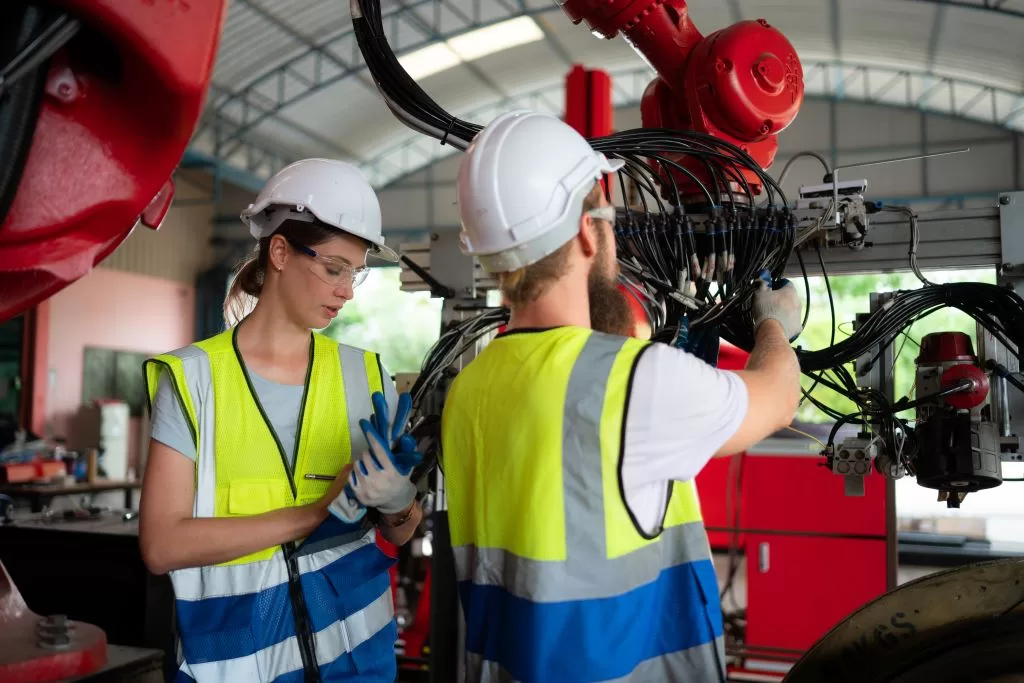Not just a man’s world – the transformation in the machinery sector
Mechanical engineering, industry, construction, and workshops: These are environments typically associated with men – at least according to the prevailing view in society. This is because women are supposedly not interested in technology and machinery. However, this perspective is outdated, as confirmed by four women in key roles at the industrial auction house Surplex.

The industry and mechanical engineering sectors, long considered male-dominated fields, are on the cusp of significant changes. For decades shaped by traditional gender roles and distributions, the rigid boundaries that hinder women’s access to technical professions and leadership positions are increasingly being broken down. Statistics paint an encouraging picture: The proportion of women in these fields is growing. This development, especially highlighted on International Women’s Day on 08 March, underscores the growing recognition of the importance of diversity in the workplace. Yet, there are still many challenges women often face.
New perspectives: women in technical professions
Surplex, an industrial auction house for used machinery in metalworking, woodworking, and construction, is also a typically male-dominated company. This is reflected not only in the industry but also in the professions: The Surplex project managers and sales managers, often with technical training, are responsible for acquiring machinery and conducting individual auctions, serving as direct contacts for predominantly male providers. Therefore, it is not surprising that two-thirds of Surplex’s employees are male.
However, Karin Schneider, Head of HR at Surplex, sees a positive change in the proportion of women at Surplex. A major problem, however, is the applicants’ experience. “The trend for more women to take up ‘typically male professions’ is still relatively new, so unfortunately, the depth of experience of most female applicants for higher positions is often not sufficient.”
The Surplex management team consists of three people, one of whom is a woman: Ghislaine Duijmelings. “It has been proven that diverse teams lead to better results. Therefore, it is crucial to consciously steer in this direction. In terms of internal labour mobility, we want to directly address women about new opportunities.” Schneider also adds, “For us, gender is less important than a person’s qualifications. Such attributes should actually be irrelevant in a modern society.” Despite the suitable working environment, why are there still fewer women in this industry?
Overcoming challenges, reducing self-doubt
“I think it’s due to cultural aspects such as stereotypical gender images, the way education is structured, and there are fewer female role models in these sectors. Also, the image of these sectors as a man’s world can deter women,” says Duijmelings, echoing Schneider’s argument: How modern is our society today?
The fact that there are few women in this industry is not because they are excluded by men, as Nancy Castañeda, Project Manager for Surplex in Spain, and Kristina Voosholz, Acquisition and Purchasing, know from their own experience. “Of course, there was the occasional remark ‘Do you even know anything about machines?’, but you have to rise above that and charmingly convince the conversational partner otherwise,” says Voosholz about her experience in the used machinery trade. Her long-standing expertise in the business has given her enough confidence to face sceptical business partners. And Nancy Castañeda feels the same: “Sometimes I felt like I wasn’t in the right place because I was surrounded by men, but I was confident that my work was good enough and I believed in myself.” Sceptics were quickly convinced, and today she has many very good relationships with her business partners. Both women have not experienced outright rejection during their time at Surplex.
Balancing career and family: a management task
The combination of family and her role as CEO is not always easy, but for Duijmelings, it’s no obstacle. “It’s important to be flexible. I don’t stress when unforeseen circumstances arise. Taking responsibility also means setting priorities.” And even though her children will always come first, it’s important to her to demonstrate that it’s important to be independent and to fulfil oneself.
Castañeda shares similar challenges between career and family. As a mother, she finds the time away from family the most challenging, an experience she shares with her male colleagues. “But the truth is, I have the support of my husband.”
So, flexibility is key for mothers – not just in technical professions. Surplex actively strives as an employer to create an environment where all employees can combine family and work. Whether through flexible working hours, part-time offers, workation (work & location, i.e. working in a different country than usual), or home office.
Diversity as the key to success
Women bring a new perspective to the market. Studies show that teams with a mix of different cultures, genders, and age groups are the most successful. It sounds like a cliché: Especially a balanced gender distribution leads to better decisions because it balances the extreme risk-taking of men and the excessive caution of women. The most important thing, therefore, is to encourage women to dare to enter technical fields.
For all women considering whether they are cut out for the machinery market or whether they should opt for a different career, Ghislaine Duijmelings has a tip: “My advice to other women: You are exactly right the way you are. Just take your position as a woman! Don’t be intimidated by what you don’t know.”
About Surplex
Surplex is one of Europe’s leading industrial auction houses and trades worldwide in used machines and factory equipment. The 18-language auction platform Surplex.com is visited around 50 million times every year. It sells more than 55,000 industrial products per year in over 800 online auctions. The company is based in Düsseldorf and has offices in 16 European countries. Over 220 employees from 20 different nations generate an annual turnover of more than 100 million euros.





























